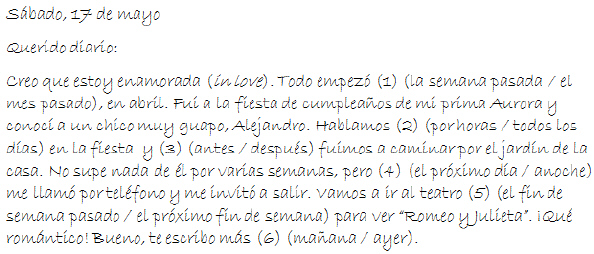¡A leer!Read the text about las salteñas and decide if each of the sentences that follow are verdadero (true) or falso (false).
?
?
Las salteñas, una versión boliviana de la empanada, son el deleite de casi todos los bolivianos. Se venden en las calles y en los restaurantes y también se hacen en casa. Es un tipo de pan rellenado (filled) con carne, cebollas, pasas (raisins), papas, guisantes y huevos. El nombre "salteña" se originó con la familia Gorriti. Originarios de Salta, Argentina, los Gorriti se exiliaron en Tarija, Bolivia a principios del siglo XX por razones políticas. Como habían perdido (had lost) todas sus posesiones en Salta, para ganarse la vida en Bolivia, empezaron a experimentar con la preparación de empanadas.
?
Manuela Gorriti, a quien llamaban "la salteña" por su lugar de origen, se encargó de vender las salteñas. En el pueblo de Tarija donde las vendía, las salteñas poco a poco se convirtieron en una tradición. "Anda a comprar una empanada de la salteña", los padres les decían a los niños. Con el tiempo, estas empanadas llegaron a conocerse como salteñas y se hicieron una comida nacional de Bolivia.
Las salteñas son típicas de Bolivia.
Answer the following statement true (T) or false (F)
True
You might also like to view...
The first reason in a/n _____________________ argument is a general principle or theory
Fill in the blank(s) with correct word
Read each paragraph and answer the questions that follow by choosing the letter of the correct response.
(I) Several circumstances can serve as barriers to effective goal setting and planning. (2) The first one is inappropriate goals, which come in many forms.(3) In one instance, paying a large dividend1 to stockholders may be inappropriate if it comes at the expense of research and development. (4) Goals may also be inappropriate if they are unattainable. (5) Second, and in some settings, an improper reward system acts as a barrier to goal setting and planning. (6) For example, people may inadvertently^2 be rewarded for poor goal-setting behavior or go unrewarded or even be punished for proper goal-setting behavior. (7)A case of this would be a manager who sets a goal of decreasing turnover3 next year. (8) If turnover is decreased by even a fraction, the manager can claim success and perhaps be rewarded for the accomplishment whereas the manager who attempts to decrease turnover by 5 percent but actually achieves a decrease of only 4 percent may receive a smaller reward because of his or her failure to reach the goal. (9) Third, the nature of an organization’s environment is also a barrier to effective goal setting and planning. (10) Rapid change, technological innovation, and intense competition can each increase the difficulty of an organization’s ability to accurately assess future opportunities and threats. (II) For example, when an electronics firm like IBM develops a long-range plan, it tries to take into account how much technological innovation is likely to occur during that interval. (12) But forecasting such events is extremely difficult and the manager who attempts to set goals and to plan in this rapidly changing environment faces a truly formidable4 task. Which of the following sentences does NOT begin a transition that signals a major supporting detail? a. sentence 3 b. sentence 5 c. sentence 6 d. sentence 9
Querido diario. Paloma escribe en su diario sobre un amigo nuevo que conoció el 17 de mayo durante una fiesta. Elige las expresiones de tiempo apropiadas para completar el párrafo.  (4)
(4)
Fill in the blank(s) with the appropriate word(s).
Would expresses what?
a) routine or intention in the past tense b) physical or mental ability in the past tense c) physical or mental ability in the present tense